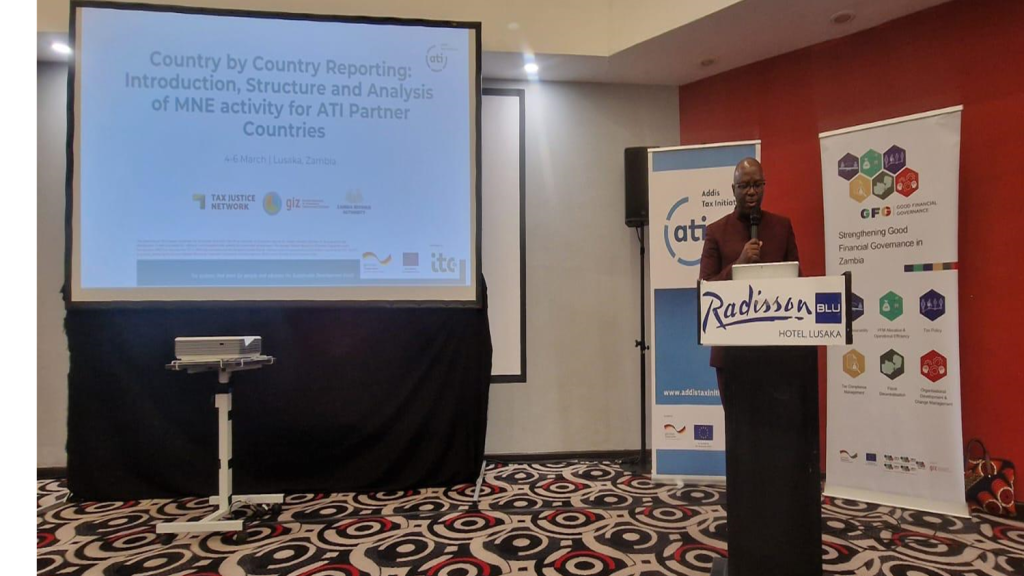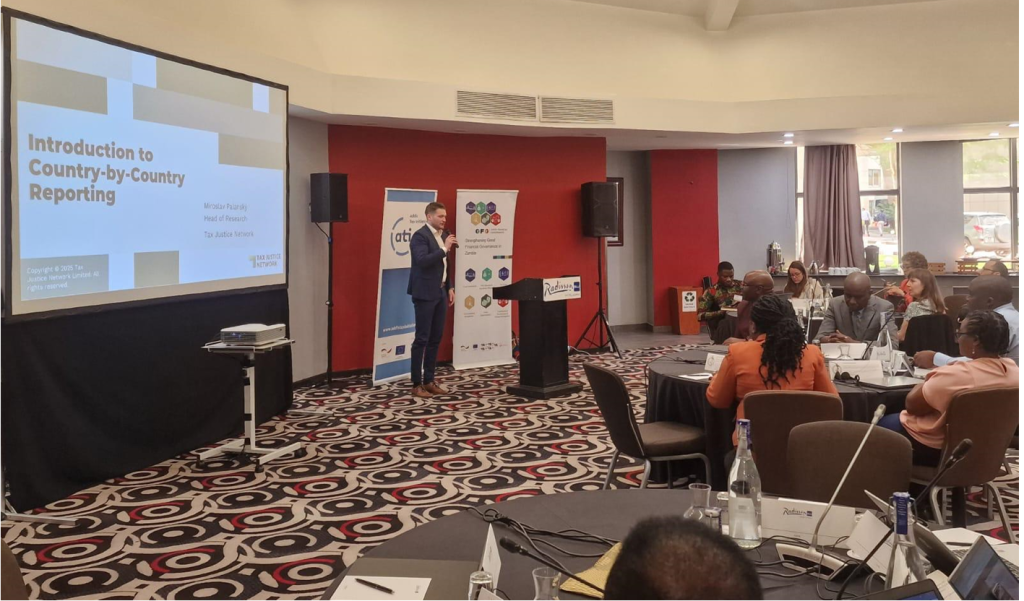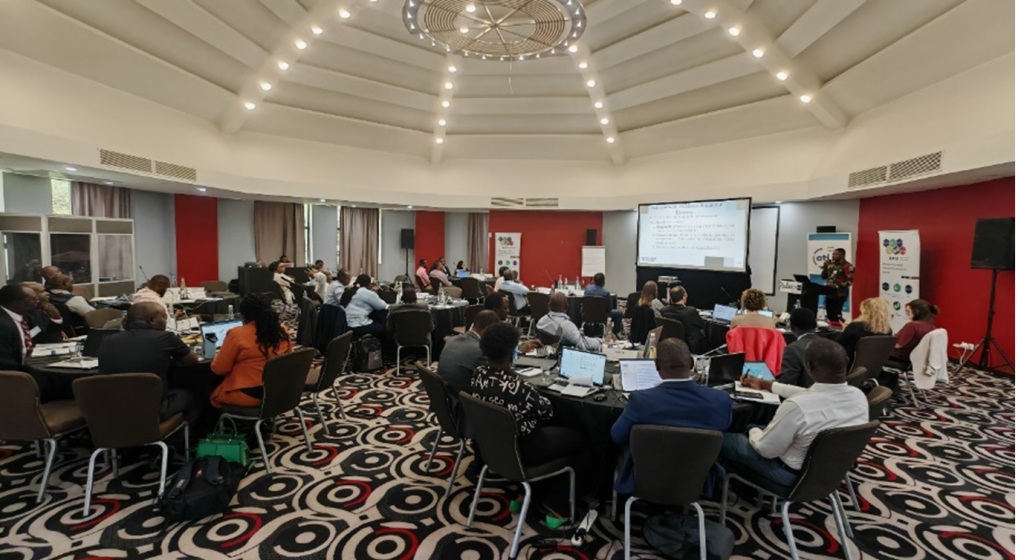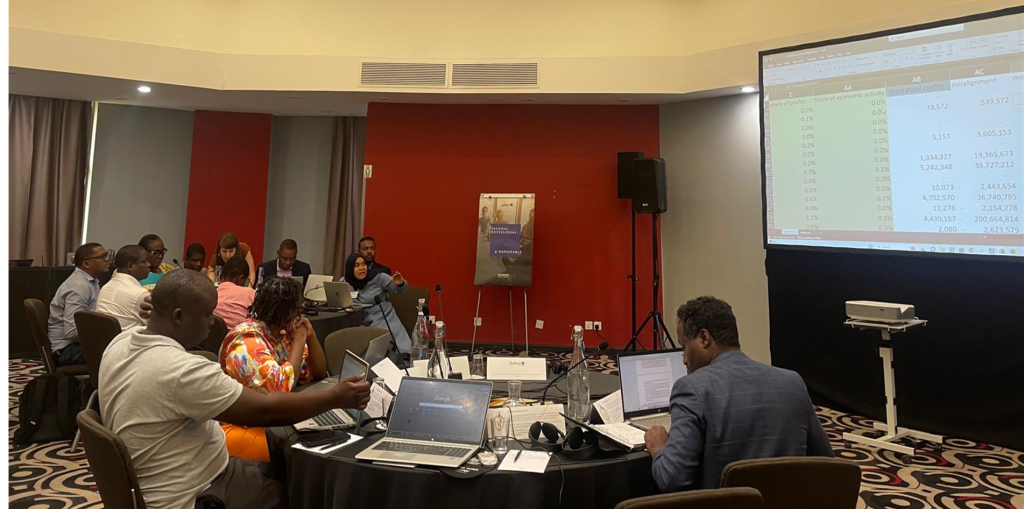
Matthew Amalitinga Abagna ■ Strengthening Africa’s tax governance: reflections on the Lusaka country by country reporting workshop

Over recent decades, the international tax landscape has grown increasingly complex, driven by the rise of multinational enterprises (MNEs) and intensified race to the bottom on corporate tax rate – often sugar-coated as “tax competition” – across jurisdictions. This race to the bottom has led to the proliferation of corporate tax havens, enabling multinational enterprises to shift profits and lower their effective tax rates, creating a significant misalignment between economic activity and reported profits. The practice is estimated to cost governments globally nearly US$350 billion annually, with countries disproportionately affected due to higher tax revenue losses relative to their overall tax base.
Considering the revenue losses, policymakers have prioritised tackling tax abuse by multinational enterprises. The G20/OECD Base Erosion and Profit Shifting (BEPS) project, particularly Action 13 on transfer pricing documentation and country by country reporting (CbCR), represents a crucial step toward enhancing tax transparency. By requiring large multinational enterprises to disclose financial data across jurisdictions, country by country reporting provides tax authorities with detailed insights into multinational enterprises’ global corporate activities, enabling better detection of profit shifting and cross-border tax abuse.
Despite these advancements, many lower income countries continue to face significant challenges in implementing and utilising country by country reporting data. Technical barriers prevent them from joining the Multilateral Competent Authority Agreement (MCAA), which facilitates the reciprocal exchange of country by country reporting data between countries. A limited analytical capacity makes it challenging to effectively leverage country by country reporting for risk assessment, even for the few countries with access to the data. These challenges are further compounded by the complexities of the proposed global minimum tax, which risks shifting tax revenues away from lower income countries to multinational enterprise headquarter jurisdictions since lower income countries lack the necessary data and capacity to monitor their compliance.
Recognising the importance of equipping tax officials with the necessary technical skills to use the country by country reporting data effectively, a workshop on its application in risk assessment and profit shifting detection was held from 4–6 March 2025 in Lusaka, Zambia.
The event was organised under the Addis Tax Initiative (ATI) with support from Deutsche Gesellschaft für Internationale Zusammenarbeit (GIZ) and its Good Governance Program. It brought together tax officials and policymakers from six African countries. The participating countries and institutions include representatives from the Ghana Revenue Authority, Zambia Revenue Authority and the Ministry of Finance, Malawi Revenue Authority, Tanzania Revenue Authority, Benin Revenue Authority, and Ethiopia’s Ministry of Finance. Matthew Amalitinga Abagna, Mario Cuenda Garcia, and Miroslav Palansky from the Tax Justice Network, along with Sarah Godar and Giulia Aliprandi from the EU Tax Observatory, facilitated the workshop, providing technical insights into using both firm-level and aggregate country by country reporting data for improved tax enforcement.
The workshop began with welcome remarks from Joseph Nonde, Direct Taxes Commissioner of the Zambian Revenue Authority. He underscored the role of the training in enhancing the capacity of the participating countries to leverage data for corporate tax risk assessment. He emphasised that equipping tax authorities with the capacity to analyse the country by country reporting data will enable them to identify multinational enterprises potentially engaged in profit shifting for targeted auditing. This, he notes, will ultimately boost domestic revenue mobilisation and sustainable economic development in the participating countries.

The workshop’s first session provided participants with a comprehensive understanding of country by country reporting data and its role in tackling profit shifting by multinational enterprises. The session began with an overview of OECD country by country reporting data, covering its history, content, availability, and current implementation status globally, as well as among ATI partner countries. Notably, none of the participating ATI partner countries currently have access to firm-level country by country reporting data via information exchange systems, highlighting a significant gap in tax transparency.

The session further explored alternative sources of country by country reporting data, including voluntary disclosures and country-level aggregate reporting, and demonstrated how tax authorities can use the data in conjunction with corporate income tax returns to assess corporate tax risks, detect profit misalignment and shifting, and enhance tax audits.
Experts also shared best practices from Slovakia, Czechia, France, Italy, and Germany, where firm-level country by country reporting data has been used in collaboration with tax authorities. Encouraged by these examples, participating countries were urged to explore introducing their own country by country reporting frameworks to compel multinational enterprises to file reports locally in order to strengthen their ability to combat cross-border tax abuse. Participants also gained practical experience visualising the country by country reporting data using the EU Tax Observatory’s analytical tools. This interactive session allowed attendees to explore OECD’s aggregate country by country reporting database, analyse global multinational enterprise activity and profit reporting, and identify misalignments between economic activity and declared profits based on the methodology used in the State of Tax Justice reports. Experts from the EU Tax Observatory also introduced the Atlas of the Offshore World to illustrate the scale of profit shifting into offshore financial centres using other methodologies.
The discussion then shifted to a regional analysis, examining profit shifting patterns in participating ATI partner countries and Africa as a whole, as well as the role of offshore financial centres in facilitating multinational enterprises’ profit shifting out of the region.
Participants were exposed to the various channels (ie transfer pricing, the use of intangible assets and intellectual property, shell companies and offshore financial centres) that multinational enterprises use to shift profits and how the current international tax system enables profit shifting by multinational enterprises. The session also provided updates on global tax reforms, including the OECD’s two-pillar approach and the ongoing negotiations of the UN tax convention.
A key discussion point arising from this session was the implementation of the OECD’s proposed global minimum tax. The proposal sets a 15% minimum corporate tax rate for large multinational enterprises to curb the race to the bottom and prevent profit shifting into corporate tax havens.

Participants rightfully pointed out that the proposal presents challenges for African countries rather than solutions to profit shifting by multinational enterprises. A significant concern is that the 15% tax rate is relatively low compared to many African countries, where statutory corporate tax rates often exceed 25%. The OECD’s global minimum tax rate is not expected to make significant reductions in profit shifting globally, and may in some cases cause African countries to lose even more to multinational enterprises’ corporate tax abuse. A key driver behind this is the proposal’s significant revenue allocation disparities, as most additional tax revenue will flow to the headquarter countries of multinational enterprises rather than their source countries, where the actual economic activity occurs.
This raises legitimate fears that African economies may not see substantial revenue gains if the OECD’s global minimum tax is implemented. Moreover, implementing the proposal requires robust technical expertise and access to corporate tax data, such as the country by country reporting, to ensure compliance. Sadly, none of the participating countries are currently receiving country by country reporting data due to the limited resources and infrastructure required to implement the Multilateral Competent Authority Agreement (MCAA).
In addition, the Trump administration’s recent withdrawing from the OECD process and its threats of taking economic “counter-measures” against countries that implement the OECD’s proposed global minimum tax calls into the question implementation and sustainability of the proposal.
The final sessions of the workshop focused on hands-on exercises designed to equip participants with practical skills in using the country by country reporting data to detect potential profit shifting. These interactive sessions provided tax authorities with the tools to interpret country by country reporting data and identify profit misalignment.
Working with the voluntarily published country by country reporting data, participants gained insight into how multinational enterprises structure their operations and report profits across different jurisdictions. They then applied various apportionment methodologies used in the Tax Justice Network’s State of Tax Justice reports to assess economic activity across different jurisdictions, enabling them to compare theoretical profit allocations with actual reported profits in each jurisdiction.

The analysis was extended to include identifying profit misalignment and potential profit shifting into lower-tax jurisdictions by integrating ‘Haven Scores’ from the Corporate Tax Haven Index and effective tax rates into the analysis. This enables participants to examine the relationship between profit misalignment, corporate tax haven status, and effective tax rates. This was followed by case studies from the extractive industries, assessing the risks posed by corporate structures in high-risk sectors such as oil and mining.
The final exercise focused on detecting companies with the highest levels of profit misalignment, including their operating locations and headquarters jurisdictions, and evaluating policy tools to mitigate tax risks. Discussions covered withholding taxes, thin capitalisation rules, and the challenges of applying transfer pricing controls in the absence of comparable data, especially in the extractive sector in Africa. Ghana, Zambia, and Tanzania shared their experiences and best practices for tackling cross-border tax abuse.
For tax authorities, these practical sessions proved invaluable. They gained hands-on experience using country by country reporting data for corporate tax risk assessment, enabling them to allocate their limited resources more effectively by focusing on targeted audits and developing tailored strategies to combat profit shifting. It was evident from the workshop that having access to detailed tax data is not enough. Building the technical capacity to analyse the data and act on findings is essential for effective tax governance.
The Lusaka workshop marked a significant step in strengthening Africa’s tax governance by equipping tax authorities with the tools to effectively enforce corporate tax compliance. For the participating countries to fully reap the benefits of the training, there is an urgent need for them to join the Multilateral Competent Authority Agreement (MCAA), which allows them to access country by country reporting data collected by other countries, develop regional data-sharing frameworks, especially in the area of transfer pricing for comparable analysis and the continuous technical capacity building to ensure that tax officials are equipped with cutting-edge skills to analyse aggregate and firm-level tax data to detect potential profit shifting by multinational enterprises.
These efforts by the Tax Justice Network to build the technical capacity of African tax administrations to utilise country by country reporting data directly respond to the commitment of the Conference of African Ministers of Finance, Planning and Economic Development on its work during the fifty-sixth session of the Economic Commission for Africa, which included the following resolution:
“6. Calls upon the international community to take appropriate action at the national, regional and global levels to ensure that illicit financial flows are treated as a system-wide challenge at the global level and that the international community adopts a global coordination mechanism to monitor illicit financial flows systematically, including through the central collation, publication and analysis of data on foreign financial accounts and country-by-country reporting by multinational companies.”
The workshop underscored the importance of regional tax cooperation, particularly in developing unified policy responses to the OECD’s global minimum tax proposal and profit shifting as a whole. African countries must continue to take a leading role in advocating for fairer tax allocation mechanisms, particularly at the ongoing UN tax negotiations, where the future of international taxation is being debated. This will ensure that global tax frameworks support sustainable development, economic justice, and fair participation in the global economy, not just for the richest countries. The momentum from Lusaka will continue as tax authorities implement lessons learned, refine their approaches to country by country reporting, and push for reforms that better serve Africa’s economic interests.
Related articles

2025: The year tax justice became part of the world’s problem-solving infrastructure

Tackling Profit Shifting in the Oil and Gas Sector for a Just Transition
The State of Tax Justice 2025
One-page policy briefs: ABC policy reforms and human rights in the UN tax convention

Bad Medicine: A Clear Prescription = tax transparency

The Financial Secrecy Index, a cherished tool for policy research across the globe

Lessons from Australia: Let the sunshine in!

Do it like a tax haven: deny 24,000 children an education to send 2 to school
The State of Tax Justice 2024


